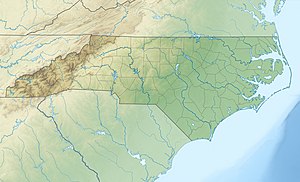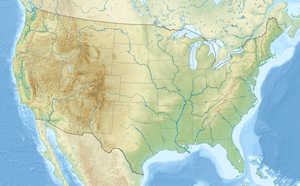Fall Creek is a 7.98 mi (12.84 km) long 2nd order tributary to the Cape Fear River in Lee County, North Carolina.
| Fall Creek Tributary to Cape Fear River | |
|---|---|
| Location | |
| Country | United States |
| State | North Carolina |
| County | Lee |
| Physical characteristics | |
| Source | Patchet Creek divide |
| • location | pond about 0.25 miles northwest of Broadway, North Carolina |
| • coordinates | 35°28′06″N 079°03′45″W / 35.46833°N 79.06250°W[1] |
| • elevation | 465 ft (142 m)[2] |
| Mouth | Cape Fear River |
• location | about 4 miles south of Corinth, North Carolina |
• coordinates | 35°31′54″N 078°58′55″W / 35.53167°N 78.98194°W[1] |
• elevation | 147 ft (45 m)[2] |
| Length | 7.98 mi (12.84 km)[3] |
| Basin size | 8.77 square miles (22.7 km2)[4] |
| Discharge | |
| • location | Cape Fear River |
| • average | 10.37 cu ft/s (0.294 m3/s) at mouth with Cape Fear River[4] |
| Basin features | |
| Progression | Cape Fear River → Atlantic Ocean |
| River system | Cape Fear River |
| Tributaries | |
| • left | unnamed tributaries |
| • right | unnamed tributaries |
| Bridges | Salem Church Road, Copeland Road, Buckhorn Road |
Course
editFall Creek rises in a pond about 0.25 miles northwest of Broadway, North Carolina and then flows northeasterly to join the Cape Fear River about 4 miles south of Corinth.[2]
Watershed
editFall Creek drains 8.77 square miles (22.7 km2) of area, receives about 47.5 in/year of precipitation, has a wetness index of 392.92 and is about 57% forested.[4]
See also
editReferences
edit- ^ a b "GNIS Detail - Fall Creek". geonames.usgs.gov. US Geological Survey. Retrieved 4 September 2020.
- ^ a b c "Lick Creek Topo Map in Lee". TopoZone. Locality, LLC. Retrieved 4 September 2020.
- ^ "ArcGIS Web Application". epa.maps.arcgis.com. US EPA. Retrieved 4 September 2020.
- ^ a b c "Fall Creek Watershed Report". US EPA Geoviewer. US EPA. Retrieved 4 September 2020.

